SEO is now one of the most in-demand digital marketing skills, but it’s not a stand-alone speciality by any stretch—there’s off-page SEO, on-page SEO, and technical SEO.
Today, we want to focus on all things related to off-page SEO.
We’ve called it a complete guide for a reason, so feel free to skip ahead to the sections that interest you with the clickable menu:
- What is off page SEO?
- Why is off page SEO important for your digital marketing strategy?
- On-page SEO vs. Off page SEO vs. Technical SEO
- Off page SEO best practices
- How to learn off page SEO
- Next steps
So let’s dive in…
1. What is off page SEO?
Off page SEO (also called off-site SEO) involves taking steps to encourage other brands and people to “vouch” for your content away from your website—hence “off-site”. Doing so helps tell Google your site and content have a great reputation and display expertise, authoritativeness & trustworthiness – which then helps improve your Google rankings.
Google considers these factors when assessing page quality, so the more high-quality “votes of confidence” a page has, the higher it will rank. Link building often springs to mind when someone mentions off-site SEO. It’s not surprising as it’s one of the most crucial aspects of the off-site SEO practice, but it involves much more than that—as we’ll see in the following section.
2. Why is off page SEO important for your digital marketing strategy?
In 2016, Google’s Andrey Lippattsev confirmed what many SEO experts had suspected. When asked in a live Q&A with WebPromo what the first and second most important Google ranking factors were, he answered:
“Yes; I can tell you what they are. It’s content, and links pointing to your site.”
2016 may be a long time ago, but the latest studies suggest not much has changed:
- Backlinko found that the “number one result in Google has 3.8 times more backlinks than those in positions two to ten.”
- Authority Hacker’s 2019 study of 1.1 million SERP results discovered backlinks are still the most strongly correlated factor for SEO success
- Ahrefs’ 2020 study again showed a high correlation between the number of backlinks a site has and its position on Google
- Data released by databox shows that SEO professionals see link-building as the most effective off page tactic, closely followed by guest blogging
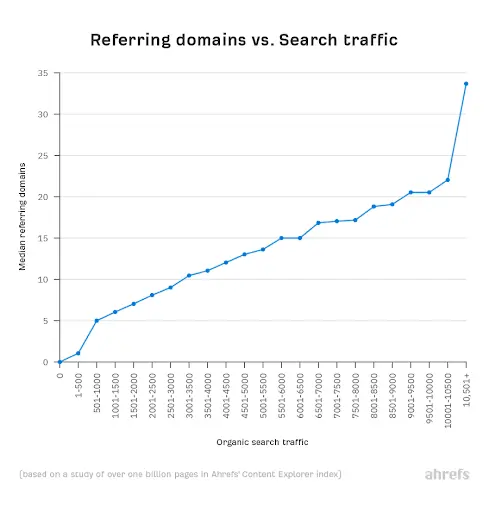
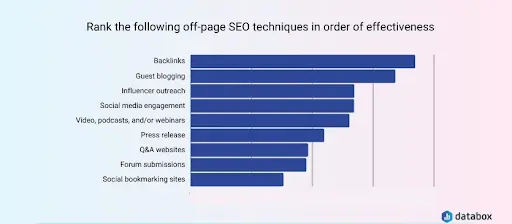
You may be forgiven for thinking that link-building strategies alone are all that matter for off-site SEO. Yet the same databox survey shows differently. SEO professionals also found social media engagement, videos, podcasts and webinars are highly effective.
3. On-page SEO vs. Off page SEO vs. Technical SEO
They may all have SEO in their title, but there’s quite a difference between on-page SEO, off page SEO and technical SEO. Each SEO area is like a pillar that helps drive your rankings in search engines—without one, success in other areas can easily fail.
As if that wasn’t confusing enough, there’s also a difference between SEO vs. SEM. But for now, let’s just focus on SEO!
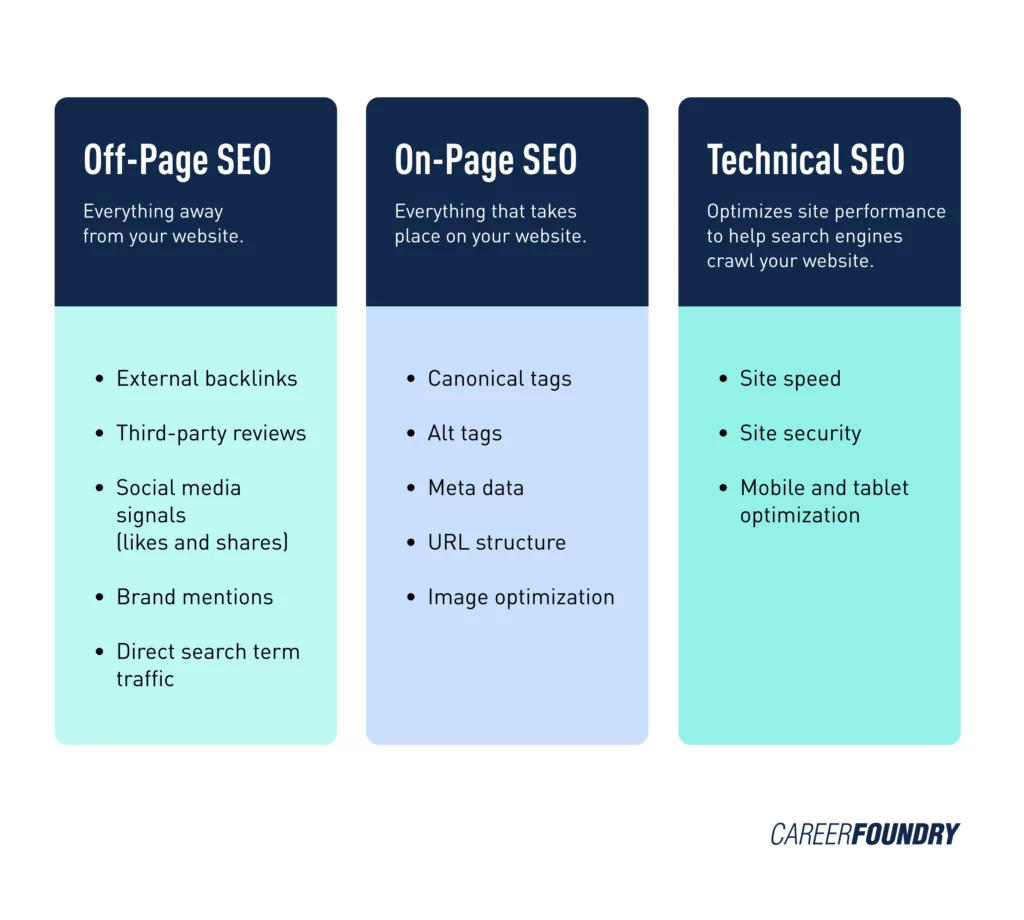
Off page SEO
So, what does Google look at with SEO performed away from your website? The answer is quite a lot:
- The number and, importantly, the quality of external backlinks to your pages
- Guest blog and podcast contributions
(Although they’re a part of link building, they deserve a special mention. Not only can they build brand awareness, they also help increase perceived expert status⸺ in both Google’s and readers’ eyes. This then helps drive other SEO strategies. Can you tell we’re fans?!) - Reviews and recommendations
As well as improving Google rankings, these also help increase your reputation and sales conversion rates. - Social media signals, such as shares, likes, comments and bookmarking
- Brand mentions
- Direct search term traffic
On-page SEO
As its name suggests, on-page SEO involves everything that takes place on the pages of your website. But we can also break this area down further into technical on-page aspects and content.
Technical aspects include:
- Canonical tags
- Alt text
- URL structure
- Image optimization
However, content really is king with on-page SEO. Google released its RankBrain AI robot in 2015, which looks at:
- How long someone spends on your page (dwell time) So, quality content that matches search intent is the key here.
- The percentage of people that click through to your page after seeing it in the search results (click-through rate) The meta descriptions need to entice clicks, without being “clickbait”. Otherwise, they won’t spend long on the page.
This aspect normally falls under the role of the content writer, whereas administrative support usually handles the technical off-page aspects.
Technical SEO
Without technical SEO, Google is going to have a hard time finding your site. It involves optimizing for:
- Site speed
- Site security
- Mobile-friendliness
- Site structure
- Unique, non-duplicated content
Unless you’re in a small company, it’s likely that technical SEO will be a specialist role⸺or even outsourced.
4. Off page SEO best practices
First things first: Nobody’s going to want to link to low-quality content, so you should assess this before any outreach. Technical SEO is also important because there’s no point in getting inbound links to your site if they’re not pointing to the right places in Google’s eyes.
Now for the best off page SEO practices.
Link building
As link building is the primary ranking factor, it makes sense to start here. When you put aside the low-hanging and low-value fruit of directories or paying for links (which is a dangerous game), that leaves links you earn through your content.
You could wait on organic links or a relevant journalistic source opportunity to arise for a long time (and that time may never come). So we’ll focus on the most popular link building strategy for earned links, which is outreach. Earned links can provide a lot of value⸺but only if you go about it in the right way.
Ensure the links are relevant and authoritative
Gone are the days of being able to manipulate the algorithm with spammy links. Whilst quantity is still a factor, they must be authoritative and relevant.
- Authoritative links come from those with high domain and page authority
- Relevance simply means it makes sense for someone to link to you. So if your SEO strategy focuses on ranking for budget-friendly kitchen design, then a link from a home decor website or kitchen items would be relevant. But a blog that usually focuses on parenting and has recently expanded its topics into home lifestyle probably wouldn’t be.
It’s therefore important to research which sites may be relevant and authoritative and you can use several tools to do so, such as Semrush, ahrefs or Moz.
An example of a kitchen design company targeting home decor websites
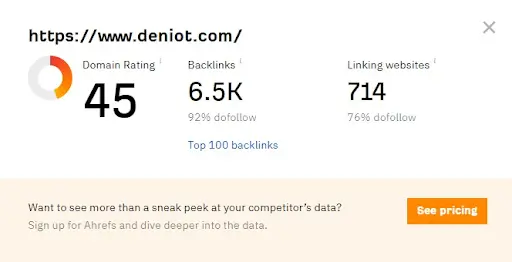
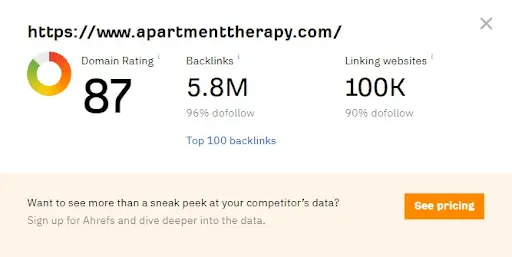
Personalize your outreach and state the value
When performing outreach, remember the rule of reciprocity and be mindful of what value a site will gain from the links. And always take the time to personalize your message, because nobody likes a spam email or InMail!
A quick overview of backlink outreach tactics
The exact tactics of link building outreach are beyond this blog post, but here are a few of the most popular:
- Requesting a link to content you’ve already published
- The Skyscraper Technique
This involves finding a page with lots of incoming leads, creating a better/updated version, and then asking sites to redirect their link to your content. - Pointing out broken links and offering a replacement piece of content
A study by Ahrefs showed that at least 66.5% of links to sites in the past nine years are dead. - Pitching a guest blog idea
(As we said earlier, this also helps build brand awareness and expert status in your subject matter.)
Reviews and recommendations
Think back to the last time you brought a product or signed up for a service and I bet you quickly checked their reviews or LinkedIn recommendations, so focusing on reviews and recommendations can quickly build a lot of traction.
As a general rule, strike whilst the iron is hot! The sooner you request a review or recommendation, the higher the response rate is likely to be. It’s also best practice to collect feedback in the run-up to sales so that you can iron out any frictions that may lead to negative reviews.
And finally, social listening tools are essential for replying promptly to any recommendations or reviews. Whether it’s positive or negative, your response can make or break your reputation.
Social media signals
Social media is currently the second most in-demand marketing skill according to LinkedIn and so it’s generally best to ensure that there’s a dedicated person, or even team, looking after the channels.
The key to gaining shares, likes, comments and bookmarks on social media comes down to:
- The quality of your content
- The amount of loyal, engaged followers you have (as acquiring followers for the sake of it is never a good idea)
- How well you’ve optimized your posts for each platform’s algorithm
We’ve linked to a free course in Section 5 that will give you a great head start on the best ways to grow your community and reputation via social media channels.
Brand mentions and direct search traffic
In reality, you have no control over these, but the strategies above should increase brand mentions and direct search traffic.
For example, someone may mention your brand online after they’ve seen your content because of your social or outreach methods. Once they become more aware of your brand, they’re more likely to perform a direct search for your brand online.
5. How to learn off page SEO
There are plenty of free online courses and in-depth blogs on off page SEO that can help you get up-to-speed with what’s required, fast. We recently compiled a list of the best free SEO courses for beginners, so that you can get started without having to break the bank.
If you want to delve deeper into SEO or some of the strategies discussed in this blog, here are a few handy resources to help:
- CareerFoundry: Intro to Digital Marketing short course: It’s helpful to start with the basics when new to digital marketing, like this course does. Not only do you receive five lessons via email covering digital marketing basics (including SEO), you can take on a creative SEO brief challenge.
- SEO vs. SEM
- The Ultimate Guide to SEO Copywriting
- HubSpot: Social Media Marketing Course (with certification): It may not have SEO in its title, but as we’ve seen, social plays a part in driving rankings and traffic. .
- Neil Patel: What is Guest Posting & 5 Ways to Guest Post
- HubSpot: How To Ask (& Get) More Customer Reviews (+Examples)
- Skillshare by Rand Fishkin: SEO Today: Strategies to Earn Trust, Rank High and Stand Out
Although only free if you’re a Skillshare user, it’s useful for those looking for an intermediate level resource and many students love his whiteboard methods.
As with any learning, the gap between theory and practice can be vast. As any job advert will show you, it’s practical experience that matters. That’s why the CareerFoundry Digital Marketing Program includes a dedicated expert mentor and tutor, as well as the opportunity to create a job-ready portfolio.
6. Next steps
As we can see, actions you take outside your website can significantly impact whether your content gets found. Even before your content ranks on Google, off page SEO can get content in front of the right people immediately.
No wonder it’s an in-demand skill.
Want to learn more about digital marketing? Why not try out this free, 5-day short course?
You may also be interested in the following articles:
